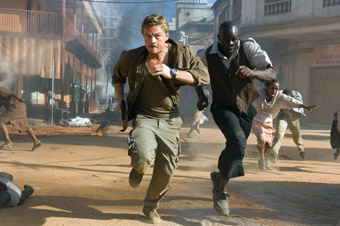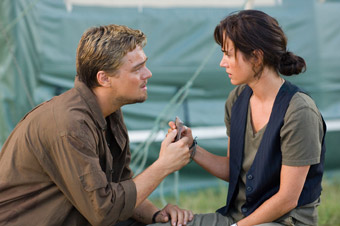| |
My
wife has actually never been interested in diamonds, and we've been married for over 25 years. So, apparently I don't need to confer eternity upon the relationship. |
| |
Edward
Zwick, director of Blood Diamond |
The
price of eternity... If diamonds cost this much, no one
should be buying them. But then like the weary, white cynics
of Zwick's worthy picture always seem to say (which explains
quite a bit of the madness that can be Africa), "This
is Africa..." Imagine the mass marketed western symbol
of blossoming and endless romantic love is a crystal pulled
out of the mud by enslaved workers, AK-47'ed into serving
masters who would cut off an arm as casually as lopping
off a branch. You don't have to imagine it. It's true. There
are many things to adore about Africa and many adorable
people (I know a few through experience) but when the fecal
strikes the fan, it does so in that continent in ways only
those expert in dark chaos could predict.
You
know the kind of movies... You happily succumb to them.
Like Lincoln biscuits, the snack that appears as appetising
and attractive as a dry, emaciated Farley's Rusk but ends
up in your mouth anyway with a shrug of sugar rewarded inevitability, Blood Diamond presents itself to you. This
movie is solid, no question there. The leading actors do
more than convince. The direction skips effectively by as
you appreciate the craft and the way the story unfolds.
The music and effects are all top notch, high budget Hollywood's
three act narrative in bold and italics. Cutting edge CG
(I imagine) recreates refugee hell in Sierra Leone at the
time of the godawful civil war in 1999. The scenery is gorgeous,
the artistic intent worthy and magnanimous ("...please
boycott conflict-diamonds and save 200,000 kids being indoctrinated
as soldiers just for starters.") and the seat in the
cinema you're sitting on is comfortable. It's not a bad
way to spend a Wednesday evening in a foreign country on
a job involving a talking giraffe... But I just could not
for the life of me - and several thousand poor fictional
African lives - (but alas, with very real historical counterparts)
bring myself to care enough.

It's
a shocking admission about a movie that tries so hard to
be earnest (and largely succeeds) but there we are. Or there
I am. Perhaps the intimacy of Hotel Rwanda is better at highlighting plight than the big budget actioner.
After all, under the surface this is a movie about greed.
Greed is the blood pumping through its veins and if greed
could be seen as a positive family binding trait, (a man
is greedy for his family's safety) it's muscle tissue too.
Bloody diamonds...
Leonardo
DiCaprio is a superb character actor who accidentally said
yes to James Cameron and is now regarded the world over
- ten years after Titanic - as a pretty
boy, lightweight mega-star with a speciality fan base in
the East. Not only does he convince me he's a weary, hardbitten,
Bogartesque bad boy, his 'seth efrican' eckcent (Rhodesian,
no less) is faultless. That's one hell of a tall order.
Actors who shy away from their perceived personas are called
'actors' (good for you, Daniel Radcliffe and even
better for Helena Bonham-Carter who said about Radcliffe's
naked turn in Equus; "He's got balls!").
Movie stars who act as character actors run the risk of
ridicule and Oscar rarely comes knocking but DiCaprio knows
he's an actor by choice, a movie star by accident and a
bloody convincing bastard in Blood Diamond and – who'd have thunk it - a credible action hero
to boot (and shoot at and punch).
In
Africa, life is cheap. I say that with no heavy handed,
western judgement or critical barb. I say it simply convinced
by experience that a continent so large can hide many misdeeds
and that its tribal societies are not governed easily or
in most cases wisely. Scratch that; in most cases, not governed
easily at all. Blair, Bush and Bono can bleat on about Africa's
needs but while money legitimately raised is channelled
into that vast continent, it also siphons off to men in
power who abuse that power to a degree regarded as almost
shameless. I was flying home from a well known African airport
nine years ago. The army-clothed gentleman at customs, with
a rifle and bucket of loose Tanzanian change in front of
him, asked me a direct question: "Do you have any money?"
I said "Uh, yes." He replied "Are you going
home?" "Yes," I replied. The penny dropped.
And dropped. And dropped. And dropped.
Margaret
Thatcher would have been right at home in Africa. And dropped.
There is a bare and poisonous undercurrent of "Every
man for himself..." in Africa which is at best woefully
bad and at worst? You don't want to know how bad things
can get when uneducated, under-privileged, testosterone
filled males get their hands on AK-47s and start to believe
that they have a righteous cause which can only express
itself in spent ammo clips, machete swings and discarded
limbs. The human race is very difficult to love when wars
break out and Africa, for all of its great natural beauty
(written with not even a whiff of irony) is no exception.
Sierra
Leone's government was distrusted by its populace for most
of the 90s (since 1961, military coups kept the governments
on their toes and one suspects they kept suspects without
limbs) and after some over-the-border Liberian enthusiasm,
the whole country was the fox that went to the dogs. Diamond
mines, the greatest source of arms funding a rebel would
ever know (irony alert considering that arms were routinely
amputated), were initiated with slave labour kidnapped from
peace-loving villages. And so here we find the actor who
has managed to secure the 'noble African' roles all
to himself, the remarkable and fiercely iconic Djimon Hounsou.
Ever since his remarkably strong eyebrows kick started Spielberg's Amistad (you have to have a special face
to kick start a movie and it doesn't surprise me that Hounsou
has had modelling experience), I've had an eye on one of
the strongest African faces I've ever seen. He is, as fisherman
Solomon Vandy, utterly convincing. Looking the part, tick
VG but Hounsou can act, can convince very effectively. His
physicality is daunting and it's a tribute to DiCaprio's
talent that he's never overshadowed by or seen to be weaker
than the bigger man. Their brutal fight over their conflicting
concerns brings up the dreaded 'k' word but in the
context it's dramatically correct. And no, 'Kiss'
is not the word we're alluding to here.
The
plot is basically straightforward. Enslaved by the rebels
to work at an illegal diamond mine and having been dragged
away from his family at gunpoint, Solomon finds a diamond
the size of a gobstopper and on an ersatz pooh break, buries
it and with the sort of luck no one outside of the movies
ever has, survives to be imprisoned after a government controlled
army raid the mine. In jail –- as plot would have
it –- is a white South African diamond smuggler (DiCaprio)
who hears of this wondrous stone and as his people pay bail,
he's already thinking that he and Solomon should become
partners (ahem) so they both can benefit from the diamond.
In the background, there's a venal western diamond industry
anxious to maintain the high prices of precious stones by
buying up all that are mined and keeping them in storage
to keep the prices high. DiCaprio's Archer –- wise
in the way that he knows how bureaucratic Africa and UN
forces work - promises Vandy he will reunite him with his
family. Little does anyone know that Vandy's beloved son
has been taken in as a boy soldier for the rebels (this
is why it is called 'infantry' apparently) by the
villain of the piece, the man who ripped Vandy away from
his family in the first place.
Phew.
The
action is deftly handled and the obligatory faux-romance
(does DiCaprio have to have a love interest? I guess it
makes sense box office wise) is suitably entertaining. Jennifer
Connelly is good but was that really the girl from Labyrinth (Kermit's not Pan's) and the same buxom figured actress-as-actress
from Rocketeer? Body shapes are odd things
to monitor but as a danger obsessed reporter, she convinces.
Actors have to do no more than convince. Let's take a pause
to consider the tear.

Those
of you in the know (can you step in 'know' and smear
it all over the carpet?), know that Jennifer Connelly had
her performance 'enhanced' in post production. There
are two sides to the argument. The first says that directors
should trust their actors to give a performance that should
not be tampered with in post and the second argument exists
in the real world... Whether I agree or not that it was
'wrong' to slide a computer generated tear down Ms.
Connelly's cheek at the requisite time is neither here nor
there. Movies are comprised of creative decisions made at
a very basic level. To make a movie you are beholden to
the tools of your craft. If ACTOR A gives a great performance
which you believe could become sublime by the additional
help of a tear CG tracked onto a cheek –- it's a no
brainer decision. You serve the story not the actor. Keanu
Reeves didn't exactly object to his (unconvincing) digital
doppleganger in the Matrix sequels. Everything
is for the movie. Everything is for the emotional effect.
I can understand the furore from actors and those that appreciate
the actors' craft but then I see it from a directorial perspective
and wonder what all the fuss is about.
This
is what the fuss is about. Connelly is now regarded as a
lesser actress (which is appallingly unfair) because the
tear was added and not directed and coaxed out at the time.
It is also a creative decision made to enforce the idea
that visible tears are the accepted barometer of emotional
worth. Which is bullshit of the loftiest order. My father
died last year and I have not shed a tear. I loved my father.
This act of non-lachrymosity does not, a heartless bastard
make. Read L'Etranger by Albert Camus and
judge whether society is best placed to judge any actions
of the individual. But then an awful lot of people read The Sun and this is why democracy is not
an airtight political system. Tears mean –- to The
Sun reader –- emotional connection and emotional
effect. But I think Connelly would have been just as convincing
without the tear.
Blair,
Bush... (Bono)... Democracy has wrought two god-driven do-gooders
whose beliefs have essentially ended many thousands of lives.
When is anyone in authority (Richard Dawkins, you need to
be knighted and financed to spread your word) going to stand
up and say:
- Who told you about Jesus/Allah?
- Could they have been wrong?
- Could they have been told by their parents?
- Could those parents have been wrong?
How
I got from diamonds to a frank dismissal of organised religion
is beyond me. But then, passions will out. Blood
Diamond is a solid if not entirely affecting work.
If it highlights anything effectively enough to make a difference
then all hail to Zwick and company. But in the end it's
a Hollywood movie about Africa and no one (in the mainstream)
yet has managed to make a movie that feels real. Africa
will always be the place where the lions roam and injustice
is framed in a liberal frame of an "If only they lived
by western principles" coda. Hey, this is Africa...
|